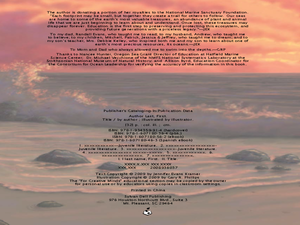Curated OER
Is a bat a bird?
Provide a concise description of why a bat is not a bird by comparing their traits. This presentation defines both birds and flying mammals, explaining how they are similar and how they are different. Note: This PowerPoint is great for...
Curated OER
Biodiversity
Short and sweet, this presentation introduces tiny scientists to biodiversity. They view pictures of three different dogs and four different spiders and compare their physical characteristics. Explorers are then sent outdoors to find...
Curated OER
Classifying Vertebrates
Second graders study animal characteristics and classification. In this animal characteristics and classifications activity, 2nd graders determine how to classify vertebrates which include mammals, reptiles, amphibians, birds, and fish....
Curated OER
Animal Cards
In this animal identification worksheet, students draw a picture of an animal and then list facts about the animal. Students also name their animal.
Curated OER
Food Chain Game
Students explore animal characteristics by participating in a role-play activity. In this food chain lesson, students discuss the order of life and how animals must eat other animals to survive. Students conduct a food chain game in...
Curated OER
Dinosaur Tracks: From Stride To Leg Length To Speed
High schoolers determine the relationship between leg length, stride length, and speed in humans and bipedal dinosaurs. They collect data and graph these human characteristics then use actual data collected from dinosaur track pads and...
Curated OER
Animal Habitats
Learners research an animal and their habitat. In this animal habitat instructional activity, students observe a WebQuest that describes the different habitats: deserts, tundra, rainforest, forest, and ocean. They determine which habitat...
Curated OER
Montana Animal stacks
Students view Ode to Chief Seattle and create an animal sculpture. In this art lesson plan, students choose a variety of materials for creating an animal sculpture using flora and fauna and other environmental images. Students discuss...
Curated OER
Classifying "Pastanimals"
Young scholars explore biology by creating a poster presentation. In this animal classification activity, students utilize a SMART board and practice organizing a group of animal shapes by placing them with similar animal families. Young...
Curated OER
Wildlife Fact File
Learners research a specific animal. In this animal science lesson, students use a "Wildlife Fact Sheet" to take notes on their specific animal. Learners use the Internet and reference books to gather information.
Curated OER
Animal Report
In this animal instructional activity, students research the basic characteristics of an animal and then answer eight questions pertaining to their animal. Students identify the environment in which the animal lives, how the animal...
Curated OER
Animal Hide and Seek
Students read about animal camouflage. In this animal adaptation lesson, students read short texts about ways in which animals hide or transform to escape their prey. Students explore animal classifications and determine ways to hide in...
Curated OER
Animal Parts Odd One Out
In this animal parts worksheet, 2nd graders read the 4 examples of animals and circle the 3 animals that share a characteristic. Students list what the animals have in common in the 10 examples.
Cornell Lab of Ornithology
Amazing Birds
What's so amazing about birds? Find out just how amazing birds are with a physics of animal behavior unit created by Cornell Lab of Ornithology. Have learners explore and tap into their observational skills and notice how birds fly, what...
Purdue University
Common Indiana Mammals
Mammals all have their own story to tell. A set of 34 cards outlines the key characteristics of different mammals. The cards include images of each mammal as well as their skulls and tracks. The back of the cards describe characteristics...
Curated OER
Animal Movements
Students evaluate biology by identifying animal anatomy. In this animal characteristic lesson, students examine pictures of horses, rabbits, bees and other animals while discussing their method of transportation. Students listen to an...
Curated OER
Form an Opinion-Cats
Students discuss which animal makes a better pet. In this statistics lesson, students examine the factors that cause people to choose one animal over the other (cat or dog). Students discuss their own opinions, and then view a video...
Curated OER
Sea World on the Internet
In this science learning exercise, students explore an animal resource guide through a given website. Students write one fact about five different animals.
Curated OER
Birdfeeder
Students explore animal attraction by participating in a class construction project. In this bird feeder lesson, students discuss the different types of birds that inhabit their native area and identify the seeds they are typically...
Curated OER
What Do We Learn From Fossils?
Students investigate what a fossil is and how it came to be. In this fossil lesson, students examine pictures of skeletons and identify characteristics that can and cannot be determined by a fossil. Students complete diagrams of a...
Curated OER
Helpful Animals and Compassionate Humans in Folklore
Students define elements of stories from around the world that include helpful animals. They explore animal character motivations and use graphic organizers to compare and contrast animal stories from different cultures.
Curated OER
Writing and Presenting a Fable Using Research
Elementary and middle schoolers research animal facts and use them in a fable. First, they pair-share to find animal traits to use in writing a fable. They then complete a prewriting worksheet. After going through the writing process,...
ARKive
Adaptations for Movement
What animals are best suited for moving around a rainforest, or a desert? Design your own animal species based on a particular habitat, focusing on the characteristics it will need for optimal movement. Great as a group lesson or...
Curated OER
Walrus
In this animal facts worksheet, students will read information about walruses including where they live and what they eat. Then students will color a picture of a walrus.

























